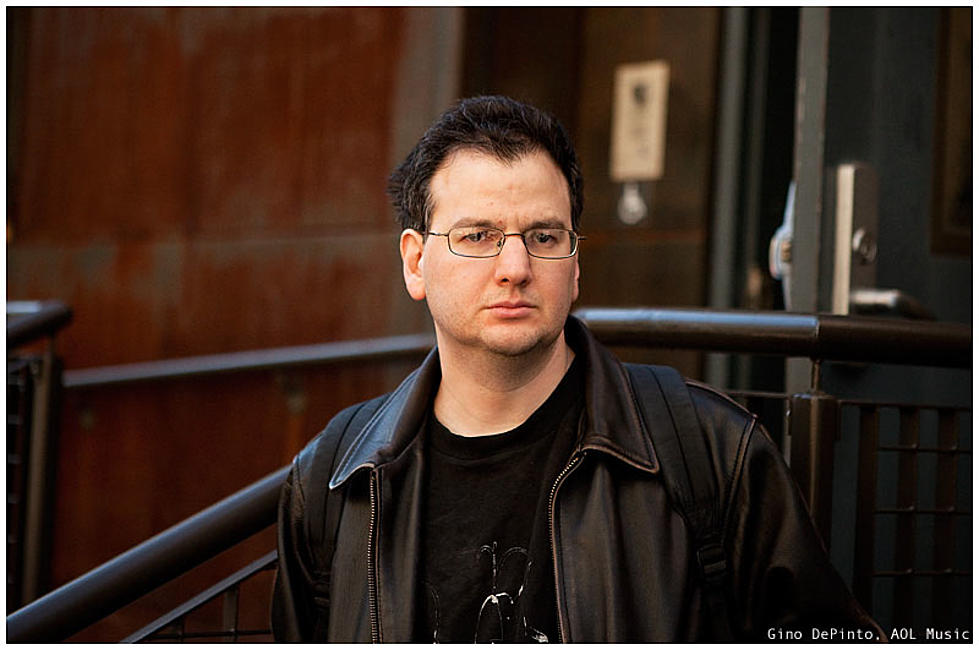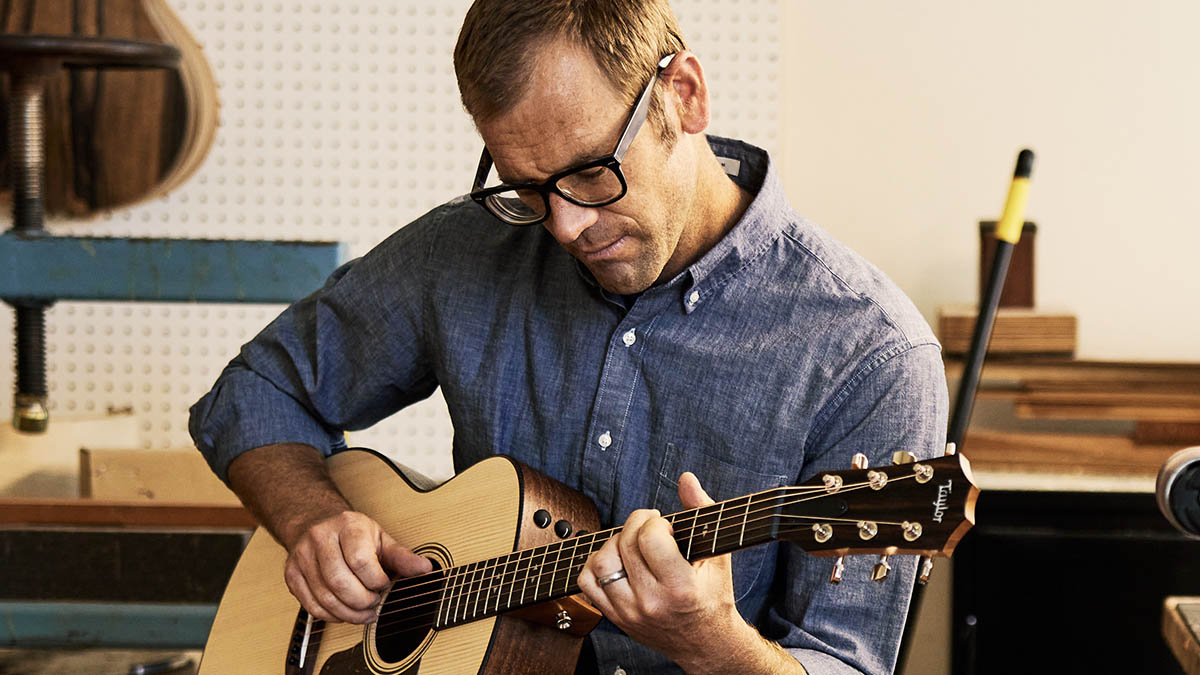Megadeth's Dave Mustaine and Kiko Loureiro go deep on the tragedy and triumph that fueled The Sick, the Dying… and the Dead!
In this exclusive interview, the state-of-the-art metal guitar duo unpack a story of sickness and recovery, and reveal how their opposing styles yielded some of the heaviest riffs and solos of the thrash titans' career
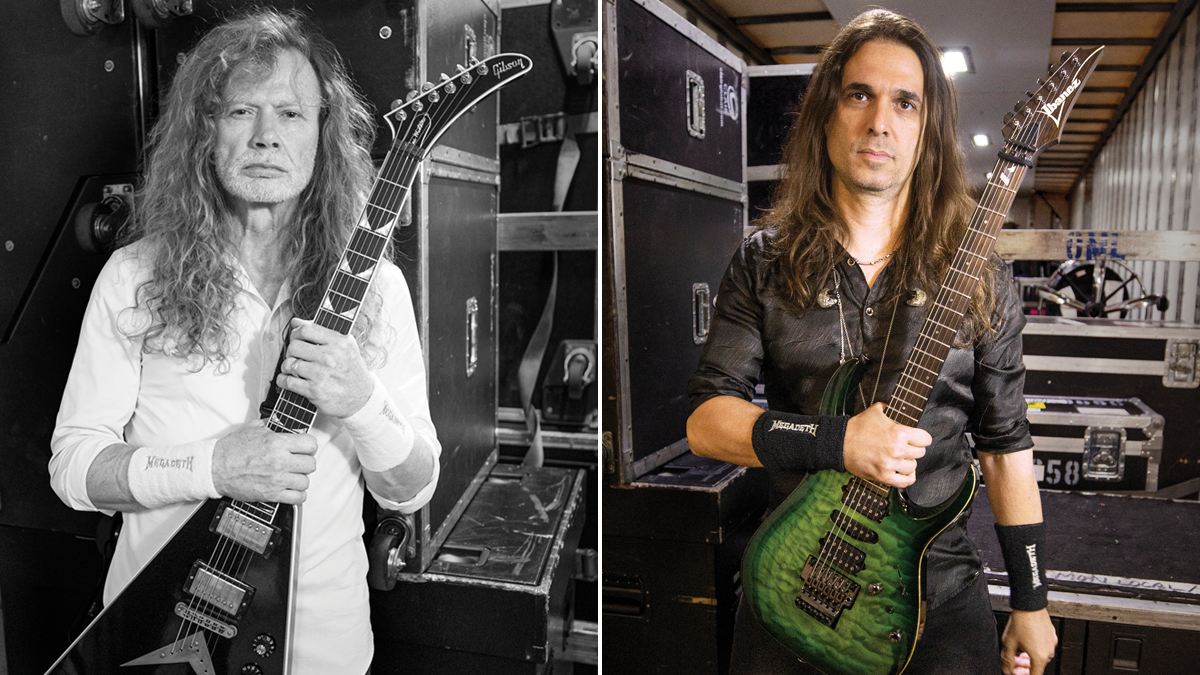
Less than 20 minutes into a lengthy conversation with Dave Mustaine, Megadeth’s mercurial frontman has revealed multiple sides of his complex personality. His greeting is warm and sincere, and it isn’t long before he’s cracking dry, self-deprecating jokes.
There are some comments about religion, thoughts on space travel and an informative aside about a new street drug called Krokodil (Desomorphine).
“It’s supposed to be like some kind of super-heroin,” he says. “It’s made from a drug that’s been approved, but when you mix it with something else and inject it, it makes your skin rot until your bones stick out.
“Now, why on earth would anybody do that? It’s cheaper than heroin and the high lasts way longer. And the life expectancy of somebody who uses it is two years. Jesus, knowing that just makes me think about how precious life is.”
Though it mostly hides under the surface – like a crocodile – there’s something irking Mustaine a little more than the thought of kids injecting flesh-melting junk, and while he keeps his cool for a while, he gets a little cranky when asked about the title of Megadeth’s 16th album, The Sick, the Dying... and the Dead!
He doesn’t object to the question per se; it’s the misinterpretation of those who automatically think they know the answer that ticks him off. The song is clearly about the black plague and was written long before the Covid-19 pandemic.
And the album cover depicts band mascot Vic Rattlehead standing on a street in an age before electricity, dead bodies lying at his feet, a burning church steeple in the background. Yet some gossip mongers still wrongly assume the album title and song have got to be about Coronovirus or Mustaine’s recent battle with cancer.
All the latest guitar news, interviews, lessons, reviews, deals and more, direct to your inbox!
You know, sometimes the best things for me come after I’m told I can’t do something. I’m like, ‘Oh, yeah? Watch me!’
Dave Mustaine
“The lyrics are about infected rats and fleas on a ship of people going from the Black Sea to a port of Sicily [in 1347],” he says with a slight growl. “It just frustrates the hell out of me when people write about stuff and they don’t do any research.”
Mustaine has good reason to be a little irate. Decades after he stopped drinking, drugging and picking fights, and learned to turn the other cheek, naysayers still look for openings to poke and prod him. Strictly from an artistic standpoint, however, it’s worked for him. As he’s proven throughout his 40-plus-year career, adversity stokes his creative flames and inspires his edgy, angular, attitude-laden songwriting.
There’s some truth to the idea that Megadeth’s main man is at his best when he’s at his worst. He has created some of the band’s greatest riffs, solos and songs – and Megedeth’s most trenchant albums – when dangling over the precipice, a snapped thread away from a fatal fall.
Early in their career, when Megadeth were penniless, practically homeless and battling heroin addiction, Mustaine led the band through such pioneering thrash albums as Killing Is My Business… And Business Is Good! and Peace Sells… But Who’s Buying?
A few years later, when wrangling with internal friction, pills and the pressures of success, he conjured the seminal technical thrash albums Rust in Peace and Countdown to Extinction.
And after recovering from an arm injury he was told would end his guitar-playing career, he lashed back with a string of records that showcased his exceptional syncopated riffing and rapid-fire lead guitar work. He thinks about this for a moment. “You know, sometimes the best things for me come after I’m told I can’t do something,” he says. “I’m like, ‘Oh, yeah? Watch me!’”
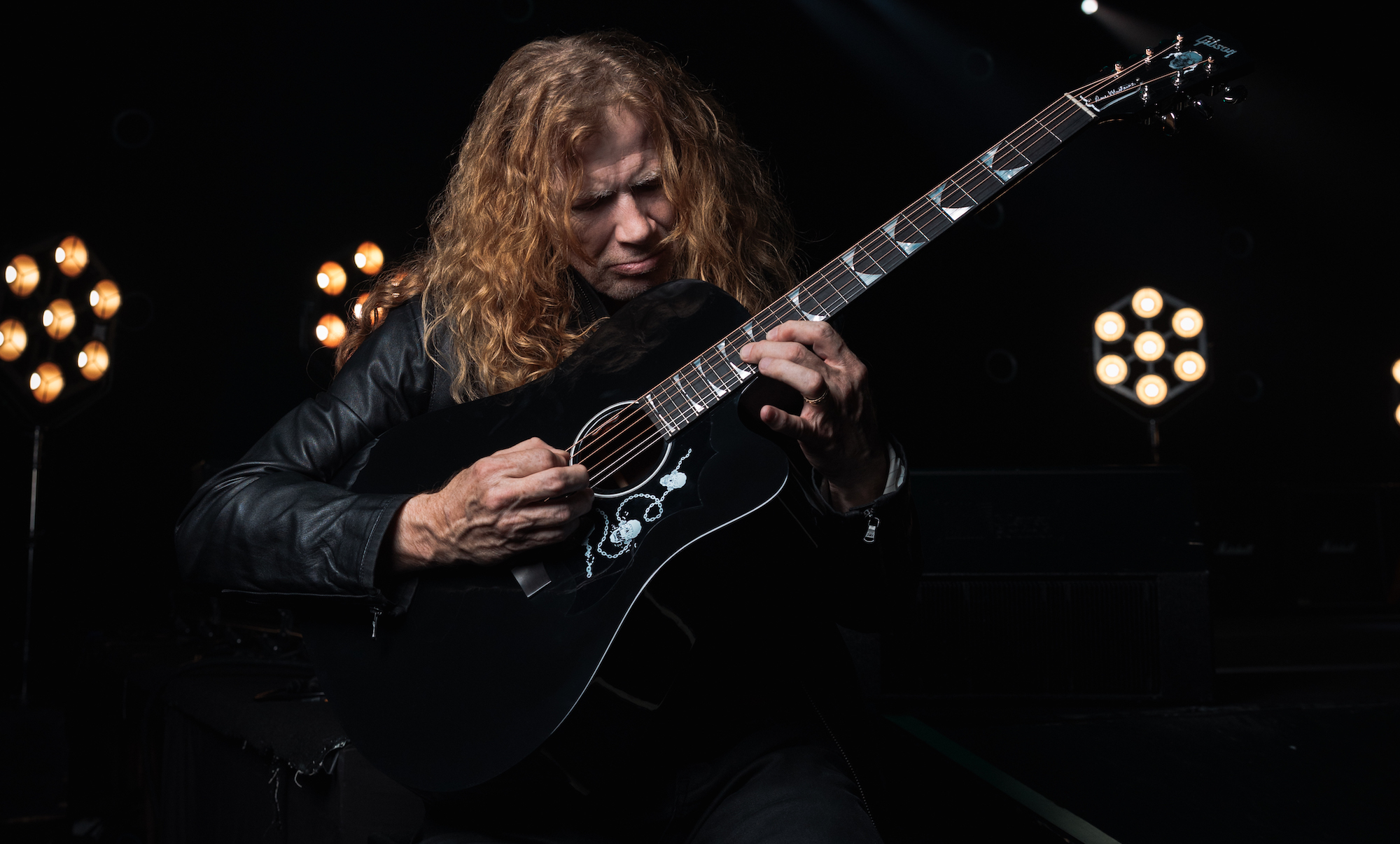
Mustaine’s former Metallica bandmates may have penned the line, “What don’t kill ya make ya more strong” (Broken, Beat & Scarred), but it’s Megadeth’s main man that has more accurately demonstrated the grammatically correct aphorism by German philosopher Friedrich Nietzsche: “What doesn’t kill you makes you stronger.”
Over the decades, substance abuse, exploitation, betrayal, injuries and – more recently – cancer have tested Mustaine’s stamina, mental stability and creativity. His faith and determination have not only allowed him to persevere, but, like the sea captain whose storm-tossed ship is being broken, beaten and riddled with holes, the frustration has left Mustaine shouting with rage-filled glee, throwing his fists to the sky and metaphorically shouting, “Is that all you’ve got?!?”
I might’ve been a little bit worried that I wouldn’t get it done if I got a whole lot worse. So there was urgency and a lot of emotion there to finish it
Dave Mustaine
Like a profound discussion with the man behind the tunes, The Sick, the Dying... and the Dead! Is a multi-dimensional and sometimes prickly endorphin rush – a twisting roller coaster ride brimming with speed, aggression, sonic exploration and lyrics that touch on past glories and failures.
Despite being a devoted Christian, Mustaine addresses the occult on Sacrifice and emphatically writes about addiction on Junkie and Life in Hell. In addition, he cheekily injects songs with references to catalog tunes by Megadeth and other thrash titans, and theatrically heightens the record with spoken-word segments, dramatic production effects and dialog snippets that belie some of the brutality.
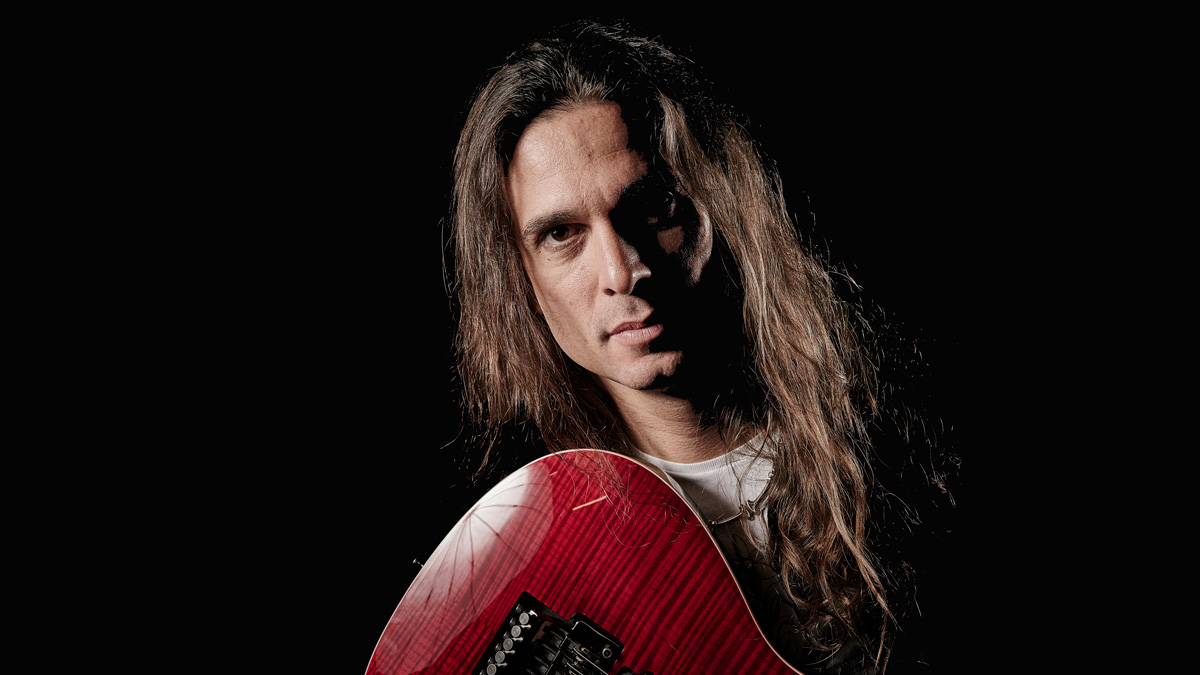
“I don’t think I’ve ever wanted a record to be totally brutal,” Mustaine says. “I don’t think this record is all hateful. I think people that like this band will find it a fun listen.”
The Sick, the Dying... and the Dead! is the second Megadeth album to feature ex-Angra guitarist Kiko Loureiro, a classically trained player who resembles a hybrid of Marty Friedman and Randy Rhoads.
Unlike his playing on the Grammy Award-winning Dystopia, the Brazilian-born Loureiro graces The Sick, The Dying... And the Dead! with an abundance of neo-classical and vintage metal chops that blend well with Mustaine’s earworm hooks and frantic thrash leads.
During a shining spring day in Nashville cooled by soft gusts of wind that feel like an oscillating fan on low cool, Mustaine and Loureiro talk about the trials and tribulations that led to the ultimately triumphant The Sick, the Dying... and the Dead!
The Sick, the Dying... and the Dead! is a heavy, eclectic record that captures the urgency, desperation and even some of the hope of the years in which it was recorded.
Dave Mustaine: “I think that’s a really important point. I’ve talked about my battle with cancer and I don’t take getting sick lightly. I do believe it was well-wishers and people who prayed or sent good thoughts my way that really helped me.
“Of course, I was praying my butt off and doing everything the doctors said. But there was a serious reality check that took place as well. And I think I might’ve been a little bit worried that I wouldn’t get it done if I got a whole lot worse. So there was urgency and a lot of emotion there to finish it.”
It was tongue cancer. I went back to my car and sat there with tears running down my face for what seemed like 10 minutes
Dave Mustaine
You received the tongue cancer diagnosis from an oral surgeon after experiencing tooth problems on the Experience Hendrix tour with Zakk Wylde.
Mustaine: “I got a root canal to fix one of my bottom teeth on the left side, but it kept hurting. So I went to see the oral surgeon. I’m sitting there in the exam room and he opens up my mouth and goes, ‘Oh, I think you got the Big C.’ I thought to myself, ‘What the fuck did he just say? The Big C? Has he ever heard of having a bedside manner?’
“It was tongue cancer. I went back to my car and sat there with tears running down my face for what seemed like 10 minutes. Then I picked myself up, got a great team of doctors together and we came up with a plan to beat this. And now I’m in full remission.”
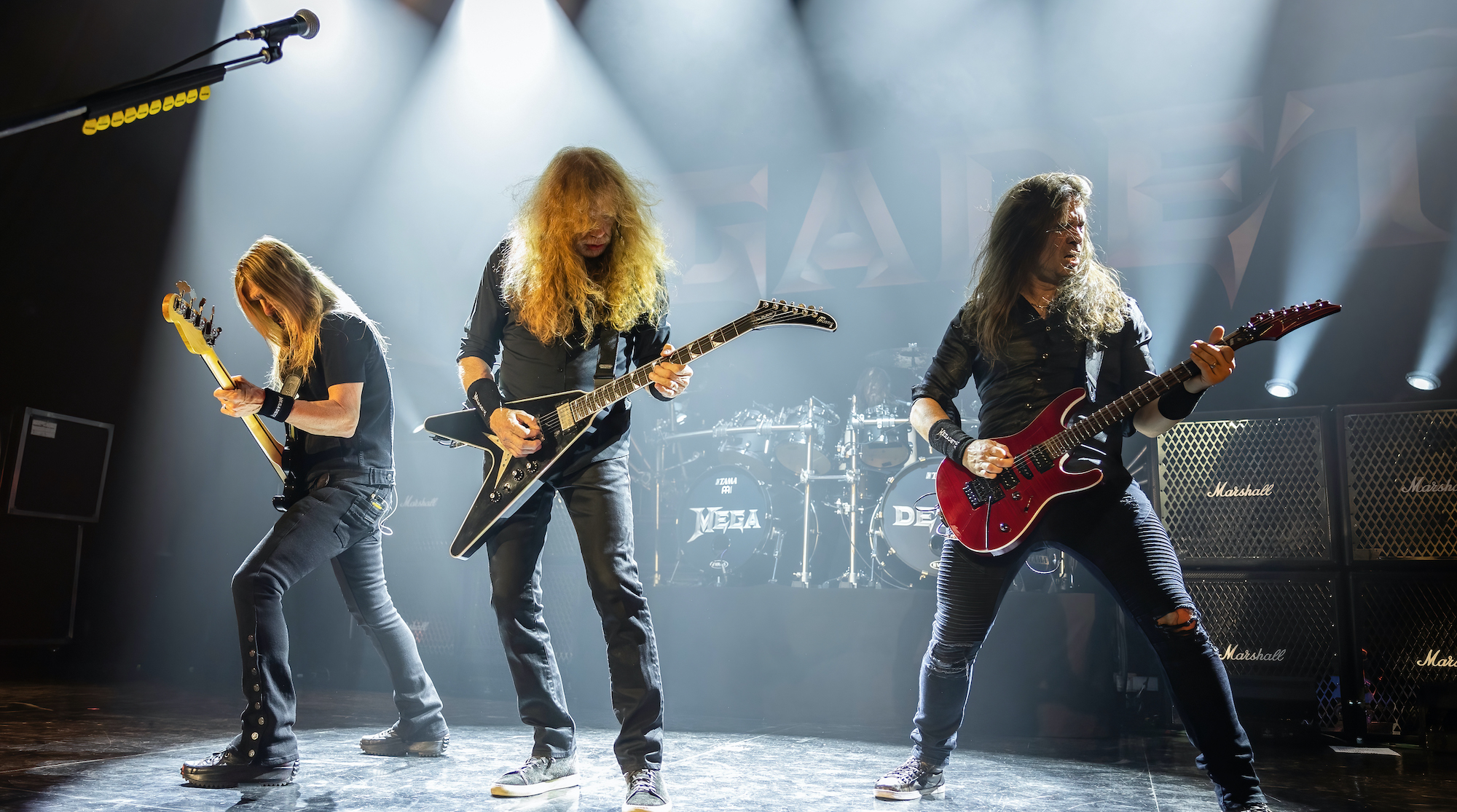
During the time you worked on The Sick, the Dying... and the Dead!, you endured nine sessions of chemotherapy and 51 radiation treatments, and while you took the required mediation and medical advice, you didn’t take much time off. Did working obsessively on the album help distract you from the medical procedures?
Mustaine: “I think it did, to a degree. The toughest part wasn’t the process of going through all the radiation and the chemotherapy. I had two really bad days when I was throwing up all day, and I thought I was gonna have to go back to the hospital and stay there.
“The rest was everything from okay days to good days to great days. A lot of the cancer medication they gave me fucked with my memory really bad. They call it chemo brain, so I’ve been having a hard time staying in the moment, but it’s getting better. Every day is a little better.”
Did you have any other symptoms aside from nausea and confusion that made it difficult to work on the new album?
Mustaine: “I used to be so physically unstable. When I would walk through a doorway I would usually hit the door frame because I had no balance. I would run into stuff all the time and fall because my balance was just shot. That was a bit of a problem, but if anything, it gave me the willpower to work even harder. If you have the will to fight and you don’t give up no matter what, I believe you’re gonna be really surprised by the outcome.”
Even though I knew I was really sick, I wasn’t scared because I wasn’t afraid of dying. I was ready
Dave Mustaine
When you were throwing up for two days straight and falling down, did you ever worry you might not win the battle?
Mustaine: “I never thought I was going to die because I had already died once before [Mustaine overdosed on Valium in 1993 and was resuscitated]. And even though I knew I was really sick, I wasn’t scared because I wasn’t afraid of dying. I was ready [just in case I didn’t make it].
“It’s very comforting when you get to that place in your life where you’re so happy and you’re so full of love that you’re ready. You’ve made peace with everything and everyone. And that if your time is now – today – it’s okay. If that happened, I would have peace with that and be ready to go.”
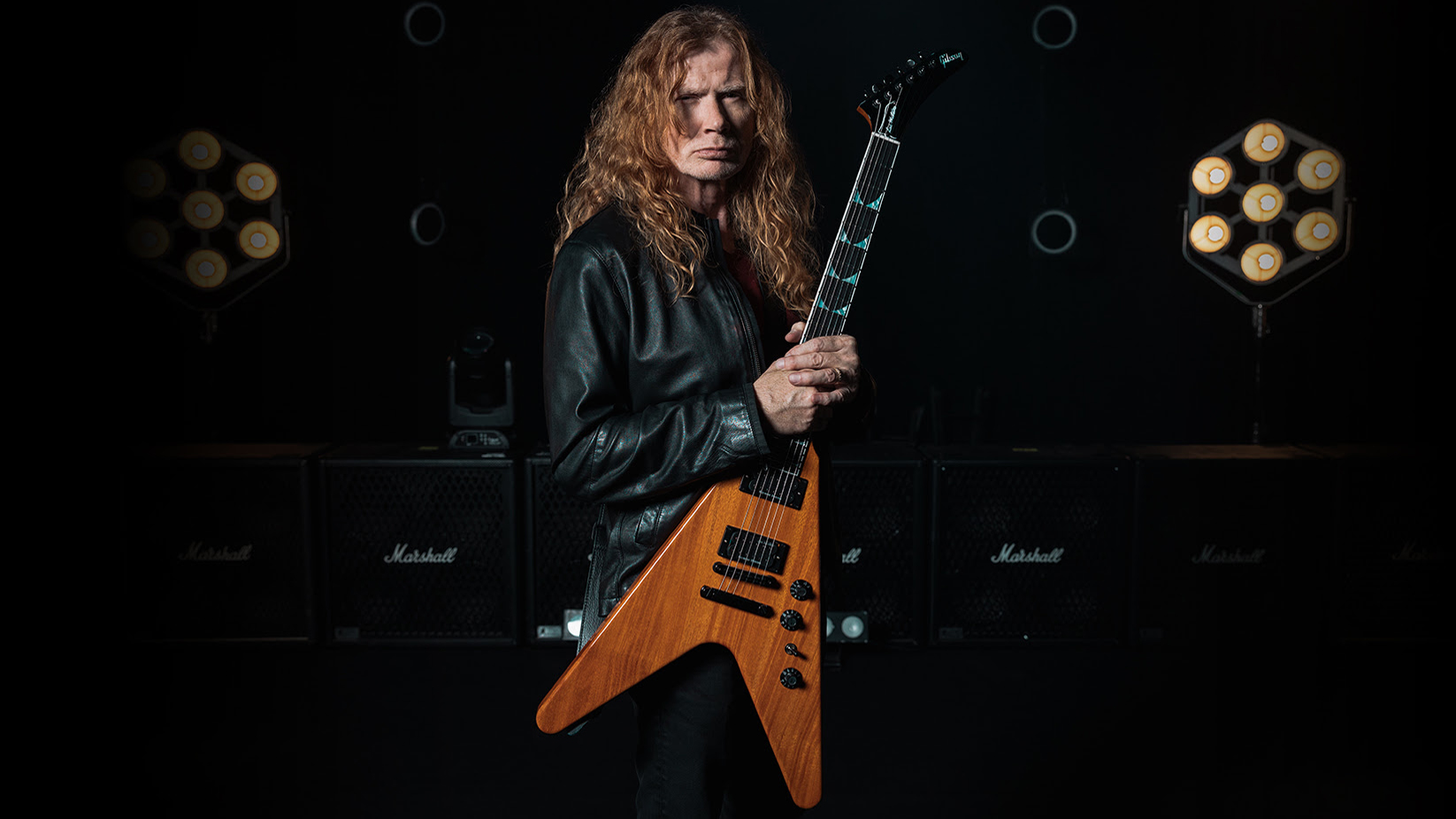
Kiko, where were you when you heard Dave had cancer?
Kiko Loureiro: “I was driving and my phone rang. It was Dave and he started telling me he had cancer. I said, ‘Wow, that’s awful.’ I was devastated. I told him I couldn’t talk because I was driving and to hold on a second. I pulled over and said, ‘Tell me again what they said.’
“He told me and then he said, ‘Don’t worry. We’re going to keep our schedule. I still want you to come here to Nashville because everything is booked.’ I was like, ‘Okay, if that’s what you want, but if you want to take some time off that’s okay.’ He said, ‘No, we’re going to keep everything the same.’”
Having made it through 'Saturday night palsy', I was pretty sure I wasn’t going to let cancer affect the way I played
Dave Mustaine
Dave, when you were under treatment and taking meds for your condition, did the doctors tell you that you might have numbness in your hands or that there could be other side effects that would affect your dexterity and challenge your ability to play?
Mustaine: “Doctors told me that when I had the ‘Saturday Night Palsy’ episode back in 2001. I had fallen asleep on my [left] arm, which was draped over a chair. [Editor’s note: the amount of time he spent in that position caused a nerve in his left bicep to become severely compressed, making the arm completely numb].
“Afterwards, I was seeing a doctor in Texas and he said, ‘You’re going to get 80 percent use of your arm back.’ I said, ‘80 percent of my playing back?’ And he said, ‘No, you are never gonna play again.’ I grabbed my stuff and said, ‘You don’t know who I am’ and walked out. I flew home and met with another doctor, who put me on this radical shock treatment therapy.
“I had to wear these crazy contraptions, and there’s still a little bit of damage to the arm. But having 80 percent use of my arm and never playing again versus shredding my ass off and having a little clicking sound... Yeah, it’s a good thing I started with a piece-of-shit car. I’m used to all kinds of clicks and cracks when I drive. So, having made it through that, I was pretty sure I wasn’t going to let cancer affect the way I played.”
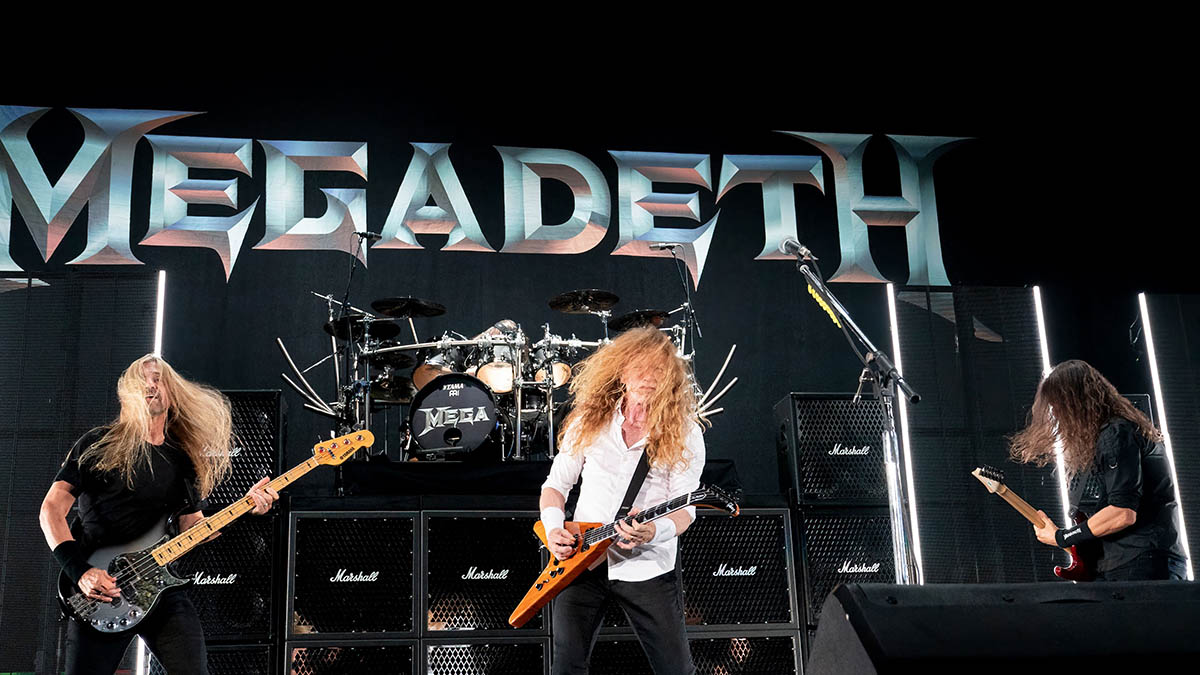
Kiko, did Dave’s perseverance make you all feel like you were taking adversity by the horns and flinging it to the ground?
Loureiro: “Yeah, definitely. I could see he was tired. He was coming from chemo and he was still showing up for work every day. When you see him doing this, you’re like, ‘Fuck yeah, let’s work on this album, man!’ It was very inspiring to see him come in and pick up his guitar and not slow down.
“The songs, the whole thing. Everything was there. Nothing can destroy this guy, you know? We were like, “Are you sure you want to work today? If you go home, we can still work on some stuff.” And he’d always say, ‘No way.’ He wanted to be there. And he put everything into the songs.
It was very inspiring to see him come in and pick up his guitar and not slow down
Kiko Loureiro
Mustaine: “It was great to work with Kiko and [drummer] Dirk [Verbeuren] for three months in Nashville in the summer of 2019 to make these demos into songs. I would get to the studio and they would all greet me with hugs, high fives and pats on the back.
“All I got was encouragement. I’d play something and it was: ‘Great solo, Dave.’ Just encouragement, encouragement, encouragement. And I think besides making a great record, we’ve made a great band.”
How long before you were diagnosed did Megadeth start working on songs for The Sick, the Dying... and the Dead!?
Mustaine: “When Dystopia came out in 2016, we started touring a little bit with [ex-Lamb of God drummer] Chris Adler, who played on the album. And then Dirk came in and everything started to get wonderful with the band. The addition of Dirk and Kiko increased our level of creativity, and they were really great and productive.
“There were several different times we were out on the road that we put a little piece together here or pieced something together there. And then we came back home and I really got inspired. We would go into my home lab and work on ideas and sections of songs for hours and hours. We finally got enough stuff put together where it was time to start assembling the full songs.”
I’m always writing and coming up with stuff, so I never go into an album saying, 'I want it to sound like this'
Dave Mustaine
The Sick, the Dying... and the Dead! includes strong melodies, complex rhythmic shifts, abrupt tempo changes, acoustic passages, sound effects and spoken bits. It’s epic, it’s cinematic, it’s infectious. It’s Megadeth! Did you know what kind of record you wanted to make when you started writing, and did you create the bulk of the songs during a certain time period?
Mustaine: “I’m always writing and coming up with stuff, so I never go into an album saying, 'I want it to sound like this.' These songs all had different lengths of germination for them to actually get finished. I wrote some of the riffs years before we started working on the album. Some were finished in the middle of the session before we took a break.
“We’d jam on stuff when we were on the road. Then we had the pandemic, the cancer thing. The guys all went home for a little bit. And we worked together when we could, but when we weren’t touring, the process was slower because we don’t all live near each other. Kiko’s in Finland, Dirk’s in L.A. and I was in San Diego at the time.”
The Megadeth rhythm sound is largely dependent on the style of picking and palm muting you do. So no matter what riff you play, whether it’s delicate and melodic or fast and heavy, it sounds like you.
Mustaine: “A lot of the technique is in the right hand. It’s not what the left hand is doing at all. Yeah, sure, there are notes threaded in there, but I think it’s the way they’re picked that makes them exciting. Doing that and having the right sound is the name of the game with Megadeth.
“You don’t have to understand exactly what’s happening; you just have to let the music take you where it goes.
Kiko, this is the second Megadeth record you’ve worked on. Did you find it easier to write for this album than for Dystopia?”
Loureiro: “When I joined the band in 2015, I went straight to the studio to record Dystopia. I knew the music, of course, and I had ideas for songs. But it’s really hard to work with a band until you really get to know them as people. And it’s only after you tour that you really get to know their style.
“After a lot of touring, we created this bond so I had more confidence to show them my ideas and participate more. I contributed writing to five songs on the album, including the acoustic parts for Dogs of Chernobyl and the beginning part of Night Stalkers.”
Dave, did you have more confidence in Kiko as a songwriter this time?
Mustaine: “Yeah, because I’ve played with him a lot and he knows the process. When we have an idea for something, we talk about it and then we work on it together in pieces. When we did Night Stalkers, for instance, it’s a song about a bunch of helicopter pilots that fly at night under darkness.
“So, there’s this spy-versus-spy excitement going on that you need to capture. The wrong music with the wrong lyrics would be a catastrophe. So we talk about what the lyrics mean and what the solos should feel like if the solo had words.”
The solos say words, just like the lyrics do, and that’s something I don’t think a lot of guitar players take into consideration
Dave Mustaine
Kiko, how do you bring your songwriting ideas to the band?
Loureiro: “It doesn’t really work to just go in and say, ‘Hey, check this out’ and play a whole riff. It’s hard for the other guys to understand how something you’ve written will work within a song when you do that. So I made a computer folder and filled it with a lot of riffs. I named each of them and kept them short.
“Each file was just the good part of the riff – the main idea. I think of it like the headline. Dave doesn’t want to read the story. It’s more like, ‘Just read me the headline and let me see if it’s catchy or cool enough.’ Then co-producer Chris Rakestraw helped me rate the riffs as well: ‘Okay, this is great. This is more Megadeth. This is not so Megadeth.’ Then we put some of the riffs together and started to make them into songs.”
Loureiro: “For me, it wasn’t so much about the solos. It was more about the riffs. Dave is very particular. He has his way of playing riffs as one of the founding fathers of this kind of music, and, for me, it’s very important to respect the style that creates those sounds, even though it’s not the way I learned to play.
“I played a lot of classical guitar and learned theory and all that. So every time I played, I used as minimal hand effort as possible and I tried to be as clean and accurate as possible.
“Dave is the opposite. He plays aggressive and dirty. I had to learn to play his way, and that includes the way you pick the strings and the chords with the right touch, the way you mute the strings – all those fine details of the rhythm guitar that Dave brought to Megadeth to get that powerful guitar sound. So when I joined the band, that’s when he went, ‘Let me show you the way we do things here.’”
Your rhythms blend together well. Are there differences between the way you set your guitar tones? For instance, do either of you scoop the mids?
Loureiro: “I like the mids. I think guitar has to have a lot of mids because the bass has a low end and a top end as well. That’s very characteristic for Megadeth from the bassist playing with a pick. So you need the mids so the guitars can fit right in that unfilled region of the sound.
“So neither of us scoop the mids. But my guitar sounds cleaner than Dave’s. He has more gain and I like a signature DiMarzio pickup that’s based on the P-90, so it’s classic-sounding. It’s not as hot as a lot of players.”
Dave, what’s the trickiest element of your rhythm playing?
Mustaine: “I like to do this thing called hand economy, where I keep my hand on one part of the guitar because I’m singing at the same time and I want to be in that area. I don’t want to have to be all over the neck and looking at my guitar and not singing right because I’m looking sideways and singing out of the side of my mouth. That’s why I’ve sung funny like that before.”
Is that one of the drawbacks of having extra time to work on an album?
Mustaine: “I don’t know. I just know I listened to what we did over and over and I kept finding new things that would make something better. And because this part got better, it made the corresponding parts or any of the subsequent parts, maybe, not as good anymore.
“So now there were these other things we had to go back and listen to carefully. And sometimes, a part we thought was fine before suddenly needed a little TLC with a new hook or riff so that it would live up to the level of the other new parts we were playing.”
Loureiro: “I did most of my stuff in Tennessee with Chris Rakestraw. Dave likes me to record first. I had the demos to work from so I recorded rhythm guitars and then the solos and acoustic guitar and some keyboards. Then Dave started recording his guitars. But it’s never that easy. I get a call, ‘Do you mind coming in to change this riff or this note…?’
“It can be the smallest detail. You can’t imagine; like, ‘Let’s start this chord with a slide.’ OK. We both record it. And then Dave goes, ‘You know what? I liked it better before.’ So, it’s minimal stuff but every little detail is carefully thought out before it ends up on the record.”
Kiko, did you have to adapt to a certain style when you tracked leads?
Loureiro: “Not really. Everyone is okay with my way of playing as long as it fits in with the band. I have some solo albums where I explore more styles and more different scales. I have to find the right spots to add those elements with Megadeth and I play them where it fits.
“And I have opportunities to do that because of the styles of past players like Chris Poland and Marty Friedman, whose solos are different from that basic pentatonic rock ’n’ roll solo. So that leaves some open doors for me to experiment.”
I’ve always believed we should give the guitar player an opportunity to do a solo that he feels is right for the song
Dave Mustaine
Have any Megadeth guitarists, despite their skill, lacked the right feeling and attitude when they did a lead?
Mustaine: “I’ve always believed we should give the guitar player an opportunity to do a solo that he feels is right for the song. If someone plays something that doesn’t work for the part, then I may make some suggestions. If it’s still not happening, I might say, ‘Okay, this is what I want you to play here.’ So it’s ‘His Way. Our Way. And if it doesn’t work it’s My Way.’ If a lead totally doesn’t work then I’m going to do the part myself. That’s what happened in Breadline. And Marty Friedman quit over the solo in Breadline [from the 1999 album Risk].”
What happened?
Mustaine: “When we were in the studio, Marty was really excited to do a solo on that song. Then, when we went to mix the album, management didn’t like Marty’s part. They wanted “Breadline” to be a single and they didn’t think the solo Marty recorded was right for that.
“I said, ‘Well, you have three choices. Either you mute the solo completely, have Marty come back and redo it, or I do it.’ And then I said, ‘If I do it, you’d better tell him.’
“Well, I redid it and nobody told Marty. So we’re in there listening to the finished album and the solo comes on. It’s my solo, not Marty’s… I looked at him as tears ran down his face and I knew right away that nobody had told him. And I knew that was probably going to be the end of Marty Friedman.”
Couldn’t you have explained that it wasn’t your call?
Mustaine: “Having been a partner with Marty for so many years, as much of an enigma as he was, I could tell he was really upset and he had had enough. What happened to Marty was definitely not okay. Our management was supposed to tell him and, for whatever reason, they didn’t do it. I think that was a terrible thing to do to him.”
Some multi-guitar bands have one player record all of the rhythms. Did you and Kiko work that way for The Sick, the Dying... and the Dead!?
Mustaine: “No. In the very beginning, when Chris Poland was in the band, I did the majority of the guitar work. I would do a track on the left and the right and then he would do one in the middle. It was kind of the same way with Jeff [Young] and Marty.
“With Al [Pitrelli], we may have doubled one in the middle. I can’t remember. With Chris [Broderick], there may have been two tracks and that may have led to what we’re doing now with Kiko. For this album, we each recorded our own main rhythm and harmony parts.”
At least you got the Grammy bucket-list item out of the way with Dystopia.
Mustaine: “The Grammy was very important to me when we got it. But I’ve got to say it was kind of odd because it felt like a lifetime achievement award and right now I don’t want to be recognized for a lifetime achievement.
“I want to get an award for something I did, I’m doing and I’m gonna do, not something I used to do and I’ll never be able to do again. At the same time the past few years have made me really appreciate the time I have left and the friends that I have. And I certainly don’t wanna leave the planet with the experience that I have and the things that I’ve learned without passing them on to somebody else.”
I sometimes think how much better things would have been if we would’ve all tried a little bit more within The Big Four
Dave Mustaine
How do you plan to do that?
Mustaine: “I sometimes think how much better things would have been if we would’ve all tried a little bit more within The Big Four. The four of us still have so much authority and power and we could do so many great things.
“It would be great if we could get together and have a meeting of the minds as these four figureheads – the metal Mount Rushmore – and think of something special we could do to really benefit young bands and musicians and artists.
“It would be great to help them avoid some of the situations we got into with contracts and substances. Because most bands make their mistakes right at the beginning of their careers. I’d love to be a mentor to some of these guys and to really help them out. That would be a really good way to give back.”
- The Sick, the Dying... and the Dead! is out now via UMe.
Jon is an author, journalist, and podcaster who recently wrote and hosted the first 12-episode season of the acclaimed Backstaged: The Devil in Metal, an exclusive from Diversion Podcasts/iHeart. He is also the primary author of the popular Louder Than Hell: The Definitive Oral History of Metal and the sole author of Raising Hell: Backstage Tales From the Lives of Metal Legends. In addition, he co-wrote I'm the Man: The Story of That Guy From Anthrax (with Scott Ian), Ministry: The Lost Gospels According to Al Jourgensen (with Al Jourgensen), and My Riot: Agnostic Front, Grit, Guts & Glory (with Roger Miret). Wiederhorn has worked on staff as an associate editor for Rolling Stone, Executive Editor of Guitar Magazine, and senior writer for MTV News. His work has also appeared in Spin, Entertainment Weekly, Yahoo.com, Revolver, Inked, Loudwire.com and other publications and websites.
